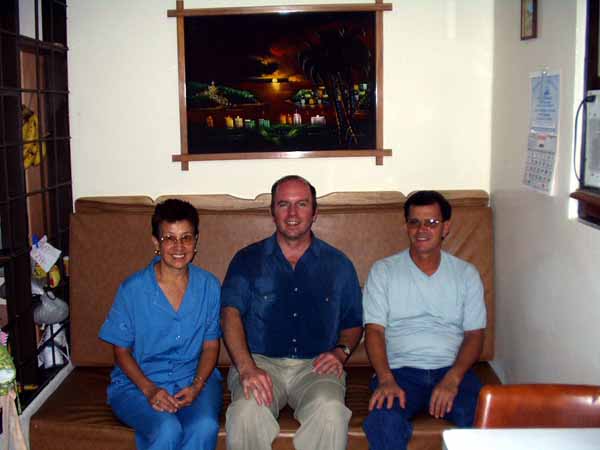
Costa Rica has beautiful beaches, fantastic parks, better protected rain forests than any other place I've seen, and has good infrastructure (roads, plumbing, electricity, stuff like that) making it easy to visit. It is the most developed of the Central American countries I visited, wealthier, less corrupt, and with a more effective legal system. This is why it is such a popular place for money laundering and gambling. Criminals and people running gambling businesses don't want to risk losing their money in a lawless country. Costa Rica is also supposed to be safer than other Central American countries, but safe is a relative term. The murder rate in Costa Rica is a small fraction of what it is in other Central American countries, but the country is still far riskier than any part of Europe or Southeast Asia that I've visited, and robbery is a big problem. I think a lot of people hear about how safe Costa Rica is and drop their guard. That would be a mistake; tourists should be very careful, especially in cities. While I was attending language school in Heredia one of the school's English teachers was mugged at knife point in San Jose, several students were mugged by gangs of youths in Heredia, and an English teacher from another school was killed while resisting a mugging in Heredia. Also, many of the tourists I spoke with had stories of muggings and snatch and run robberies. I heard that so many passports were stolen in Costa Rica that the U.S. embassy would no longer issue replacements; if you are a U.S. citizen and your passport is stolen you have to return to the U.S. to get a new one. I don't know if this is true, but I think it is reasonable. I've never heard of anyone losing a passport that was properly secured--either locked up or hidden underneath the clothes.
Don't let me scare you away from Costa Rica, I was there for seven months so I heard of more crimes than I would have in just a few weeks. Other than having to brush off a few aggressive prostitutes and one clumsy kid trying to pick my pocket, I had no problems. Besides, you can pretty much avoid the crime problem by avoiding the cities, and you don't visit Costa Rica for its cities. Outside of San Jose and the larger towns Costa Rica is quite safe for anyone who is reasonably cautious. It's easy to know when you are in one of the risky areas; if all the business and homes have steel bars over the windows, security doors, high fences and sturdy gates to keep people out, then you are in an area with a crime problem. It's not that bad a thing relatively speaking; in many other parts of Central America the "secure" places are the ones with shotgun toting security guards and lots of police and soldiers carrying automatic rifles. So while you don't want to drop your guard in Costa Rica, there are definitely worse places. Besides no one goes to Costa Rica for the minimal charms of the cities except for the sex tourists. You go to Costa Rica to see a range of tropical ecosystems, volcanoes, and beautiful beaches, as well as monkeys, iguanas, alligators, sea turtles and a variety of other creatures.
Actually Costa Rica is safe and stable enough so many U.S. citizens feel comfortable buying a vacation or retirement home there, which leads to one more warning--spend some quality time learning what you are getting into before buying property in Costa Rica. Of course this caution always applies when buying property in any country. Even in the U.S. most people don't understand real estate law and the limitations on their property rights. In other countries buying property can be a leap into the unknown. Rich naive foreigners are sometimes the victims of land fraud in Costa Rica and compound the problem with poor legal representation. Costa Rica does have a well developed legal system but not a Bar association comparable to the ABA; all a person has to do to work as a lawyer is put a sign in front of their office that says "Abogado". I don't know if these abogados are operating legally, but they are out there providing poor legal counsel. I read of one U.S. citizen who was evicted from his property after being presented with a bill of sale with (what he said was) a forged signature. He went to court on this, but chose an unqualified lawyer (abogado) who presented an unconvincing argument that the signature was forged. He lost the case and when he tried to appeal the verdict he could not try to once again argue that the bill of sale on his property was forged, which was his best argument for reclaiming his property. In Costa Rica, as in the U.S., you can't appeal a verdict on the grounds that you want to present the same argument but try to do a better job of it (I'm not a lawyer and I'm presenting a very simple-minded summary of the court case and the law, but you get the idea). I don't know how this case turned out, but if you buy property in Costa Rica and encounter problems keeping what you paid for, you want a lawyer/abogado protecting you who knows how to do things right. Once again, make sure you know what you are getting into.
Costa Rica's economy seems to depend on tourism, agriculture, a large Intel plant, money laundering and gambling. The official currency is the colon, but many transactions are done in dollars, many ATM's give a choice of withdrawals in dollars or colones, and most businesses seemed willing to exchange dollars for colones. People who are fluent in English can easily get a job in "Sports Book", which consists of taking bets over the phone and internet. I don't recall the pay, I think it was about $100 to $150 a week, adequate for getting by in Costa Rica. People fluent in Japanese could earn quite a bit more. I don't know if this type of work was legal for foreigners, but it was common. I heard money laundering was common, and there did seem to be a lot of cash businesses, mostly bars and casinos, that stayed in business in spite of a scarcity of customers. I heard an interesting story in Antigua, Guatemala from a bartender, Jason, who had previously been managing a bar in Jaco, Costa Rica. I knew the bar because I was staying in Jaco when the bar, Filthy McNasty's, and another bar, Crocodile Rock, had been opened by The Vault Holding Company. Filthy McNasty's did a booming business, and Crocodile Rock was consistently dead. Jason told me that he was proud of his success running Filthy McNasty's until he saw the books. He knew the bar was doing well, but the books showed it making far more than it actually was. He realized he was managing a cover for something he didn't want to be involved in, so he quit. That's why he was working in Antigua. About a month and a half after Jason quit filthy McNasty's the offices of The Vault were raided and the books seized. The boss committed suicide the same day. I wonder what The Vault was into that would motivate a man to commit suicide rather than deal with the police and auditors. "The Tico Times", Costa Rica's english language newspaper, covered the misfortunes of the Vault and other questionable deals. If you go to www.ticotimes.net and search the archive section you can read more about The Vault; there was a good summary published on June 27, 2003.
The Vault was not the first questionable investment company, and I'm sure it wasn't the last. The Vault started advertising itself heavily as an investment company shortly after a business called The Brothers ran into trouble. The Brothers was a classic; it was a long running "give us your money and we'll do stuff with it" investment company that really did make some people a lot of money. Then it disappeared, along with a rough estimate of $1 billion. While it was running it would pay investors 3% interest monthly on their deposit. You were only accepted as an investor if you knew someone who was already in on the business. If accepted you would deposit a minimum of $10,000 with the brothers, Osvaldo and Luis Enrique Villalobos. If you took the 3% interest each month you would earn $3600 a year on your $10,000 investment. If you let the interest and original investment compound your money would double in two years. At the end of fourteen years your $10,000 would grow to more than $1 million. All of this was by word of mouth, handshakes and cash--no receipts, no looking into the books, no questions asked. This business had been operating for twenty years when if finally collapsed. There were stories that the Villalobos brothers had started out helping the CIA funnel money to the Contras during Nicaragua's civil war and then moved on to laundering Colombian drug money, but anyone who really knows is not talking.
The Brothers had over 6300 investors (if that's the right word for them), including a lot of ex-pats. Over $2 million a month in interest was paid out. The people who got in early and took the interest each month made out very well; in less than three years they had recouped their original investment and everything else was profit. No one knows how the deal worked, but speculation was that it was either money laundering, a Ponzi scheme, loan sharking or a combination of the three. Of course the people who invested didn't care how it worked, they just wanted the money to keep coming. Then a Canadian investigation into drug money led to a money exchange run by Osvaldo Villalobos and his eventual arrest. Enrique disappeared along with whatever books might have been kept. The Costa Rican government took over the business but found only a small fraction of the money. People who had been letting there investments compile for years and thought they were millionaires were left with nothing. So were the people who had sunk all their savings into The Brothers and were living off the monthly interest. Many of these people didn't blame the Villalobos brothers for being crooks or themselves for being fools, they blamed the Canadian and Costa Rican governments for messing up such a good deal. Months after the collapse I met an American who insisted the whole operation was a legitimate business making legal high interest loans until it had been ruined by these governments. He also angrily insisted there was no need for a business such as this to show its books to investors or provide any kind of a paper trail. I say the results speak for themselves. The archive section of the on-line Tico Times has a number of articles about The Brothers. If you search internet news sites using key words like "villalobos", "brothers" and "costa rica" you will find a few other stories on the subject. There is a very good summary published by the Pittsburgh Post-Gazette, www.post-gazette.com, on May 11, 2003, "Investment operation in Costa Rica took in hundreds of millions, then it all fell apart".
Ok, a few particulars. I arrived in San Jose Costa Rica the evening of 13 Aug. '02. I got a basic room in a place called Hotel Ritz for $24. It was five blocks from Avenida Central and the tourist area, but those five blocks didn't feel very safe after sunset. After two nights I upgraded to a much nicer place, Hotel Morazan, for $35. This was right in the center of the gringo tourist area; not a great place to experience Costa Rica but the streets there were well lit and well patrolled. Later, after I learned how common muggings were in San Jose, I was very glad I didn't stay in Hotel Ritz. While in San Jose I checked out the limited sights and looked into Spanish schools. None of the sights warranted a picture, but there were many Spanish schools to choose from. I settled on one called Intercultura in the town of Heredia, about a 30 minute bus ride from San Jose. Intercultura teaches Spanish to tourists and English to Costa Ricans. The school was nice and Heredia, a college town, was much more pleasant than San Jose.
On 25 August I moved in with a Costa Rican family, Ana and Ernesto and their son Danilo and daughter-in-law whose name I neglected to write down. The family only spoke Spanish, and I spoke almost none, but we managed to get by. My hours didn't mesh with the son and daughter-in-law so I didn't see much of them. Having an adult son and his wife stay with the parents until they can afford their own home is common in Costa Rica. The three bedroom house was big enough to accommodate all of us and everyone's hours were sufficiently staggered so access to the one bathroom wasn't a problem. The family was nice, the house was comfortable, the food was good and after one month I had to get out. I've been a bachelor all my life and I've gotten to old and ornery to fit into this kind of family situation.
This is Ana, me, and Ernesto just before I moved out (I'm drenched in sweat after carrying all my stuff to the new apartment on a warm and muggy night):

The school was excellent. The teachers were good, the staff very helpful and the other students, most of whom were half my age, were friendly people who didn't mind having a beer with an old man. During the four months I was with Intercultura the mix of students fluctuated a lot, but on average it was about half from the U.S. and half from Europe, not counting one or two Canadians and one Japanese student. Most were college students on break or recent college graduates having an adventure before grad school or real life. There were usually a few more female than male students, but I didn't make a fool of myself chasing after twenty year old girls. None of them chased after me either, darn it.
While I liked the school and learned a lot, the next time I try to learn another language I will go somewhere where it is easier to talk to the local people. The problem with practicing Spanish in Costa Rica is that Costa Rican men, Ticos, don't want to talk to gringos, they want to chat up the gringas. And most Costa Rican women, Ticas, are kept closely guarded by their families until they are married, and are kept closely guarded by their husband's families after they are married. So it is easy for the female Spanish students to practice in a social setting, but not so easy for the men. Maybe this is why I observed more gringas studying Spanish than gringos. I know this would have been less of a problem if I had continued staying with a Costa Rica family, but I just couldn't handle it.
This is similar to my one complaint about Intercultura. They offered free latin dance classes, but if you didn't already know a lot about dancing, it wasn't worthwhile for the men to try. The instructor, male of course, would give a quick demonstration of the basics, then a quick demonstration of some fancy moves, then he would go around the class dancing with the women. The women loved it; I didn't. I needed to spend a lot of time on the basics. The steps involved much more than just moving the feet; each step involved movement of feet, knees, hips, shoulders, head and weight. And the steps move really fast. This did not come naturally to me. Kids in Costa Rica start learning this stuff shortly after learning to walk, so all the Ticos were incredibly good dancers and eager to help visiting gringas. Ticas were usually chaperoned when out and were not as eager to help clumsy gringos practice their dance steps. I stubbornly stuck with the class for weeks but finally gave up.
Enough gripes. One of the best things about Intercultura was that they arranged weekend trips to interesting places in Costa Rica. The country is small enough so that in a centrally located place like Heredia you can reach any part of the country by bus in about a half day or less. Many of the following links are from these trips. The first weekend trip at the end of August was to:
On the second weekend, September 7 to 9, was a trip to:
The following week I caught a cold, so I stayed in Heredia and mellowed. This was the rainy season in Costa Rica, and I was getting soaked a lot. I went on a tour of a local coffee business, Cafe Britt, checked out Heredia's bars, and slept a lot, missing most of Costa Rica's independence day activities. The following weekend I was much better and went to:
I returned to Heredia late Sunday night and moved into a small $200 a month cinder block room with a sink, refrigerator, microwave, shower, toilet and bed. The apartment choices in Heredia are really bad. The fellow below provided security. When I was in the apartment I usually left the door open since there were no windows and I like fresh air. This guy would stop by to visit. We got along fine until he started marking my apartment as his territory, we had something of a falling out after that.
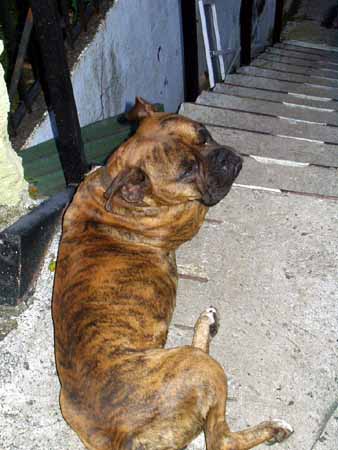
I have one crude story about the guard dog that I should omit, but I can't resist. One night when I was studying he came into my apartment looking somewhat sheepish and with what looked like a tail. Upon closer inspection I saw that the "tail" was actually a plastic grocery bag that he had swallowed, probably because it has some tasty drippings on it, and had not been able to pass in one go. He was clearly embarrassed and hoping I could help him out. I briefly considered wrapping the extrusion in a paper towel and giving it a yank, but then I thought that everyone has their limits, and pulling stuff out of this dog's butt just might cross the line for him. And that would be a heck of a thing to explain in a hospital emergency room; "Well doc, I was pulling a plastic bag out of a pit bull's ass, and then....." I decided to let the dog work things out on his own. The next time I saw him he had lost the tail and both of us were in good health, so I made the right decision.
Back to more appropriate topics: The weekend after the Monteverde trip I spent settling into the apartment and went with a group of students to a cluster of bars in San Jose called El Pueblo. It wasn't bad, but was for young people who could salsa dance. The next weekend the school didn't have anything interesting going so I went on my own to:
Parque Nacional Baulio Carrillo
After settling in the apartment I started swimming regularly at a pool in between the apartment and classes. The next few weeks were nothing exceptional; classes, swimming, studying, and checking out the limited nightlife of Heredia. The school didn't offer any interesting trips to places I hadn't been until the weekend of October 25, when I went with a group of students to:
The following weekend I had to leave the country. People from the U.S. and many other countries can stay in Costa Rica for 90 days without a visa, then need to spend three days out of the country. The common solution to this problem is a weekend border run to Panama or Nicaragua. I chose Panama and went with Alexandra, a 20 year old Swiss student who also needed to make a weekend visa run. There was nothing between us, we just both needed to make a visa run at the same time. I wanted to set the record straight in case Alexandra's father reads this. Anyway, the next stop was:
I took a week off from classes after the Panama trip. By now I had exhausted all the school organized trips, so after paying some bills and other details, I took a long weekend at the beach in Tamarindo. This was basically a scouting expedition for later. Aside from a downpour when I arrived, and on and off rain the rest of the weekend, and a sleazy guy who hung out around bars asking tourists if they smoked cocaine, it was a decent place. I made arrangements for a return trip in December, the start of the dry season.
I took one more week of classes with Intercultura in Heredia, then my last week of classes for the year at their school in Playa Samara. I liked Samara and decided to return. More on this later. By then it was the end of November. After classes ended in Samara I took a bus to Nicoya, Nicoya to Santa Cruz, then a late bus from Santa Cruz to Tamarindo. By now I was fairly competent at tourist Spanish, which was useful since I was meeting very few people who spoke English. So the first ten days in December I was in:
I left Tamarindo on December 10 and returned to Heredia. I spent a few days there shipping Christmas packages to the U.S., paid for classes after the holidays with Intercultura in Samara, and on December 14 flew from San Jose to Miami (don't enter the U.S. through Miami if you can possibly avoid it, especially around holidays), Miami to JFK in New York, and New York to:
I returned from London late on January 2 and checked into a room I had reserved at Hotel Diana's Inn in San Jose. Two nights later I moved to Hotel Boulevar on the Avenida Central Pedestrian Mall. Diana's Inn was cold, noisy, and, though on a well lit street near the tourist center, had some scary looking prostitutes working the area at night. I returned from London with the beginnings of a head cold and did not want to deal with all this.
In spite of the cold I went on a group tour to Vulcan Poas on January 6. Vulcan Poas is an occasionally active volcano a short distance from San Jose. Its last major eruption was in 1954, and there was a minor eruption in 1989. The crater is described as "a steamy and bubbling cauldron." This is what it looked like when I was there:
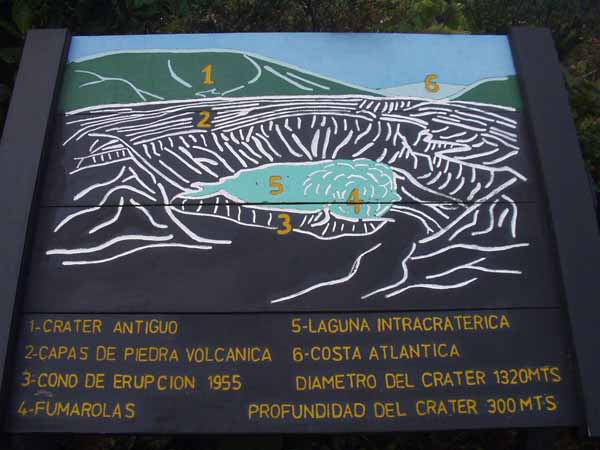
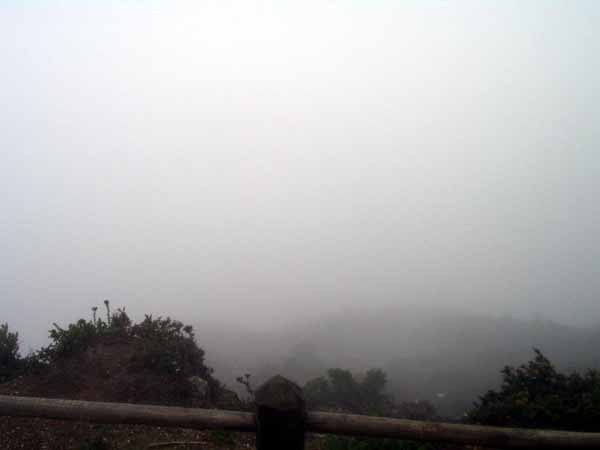
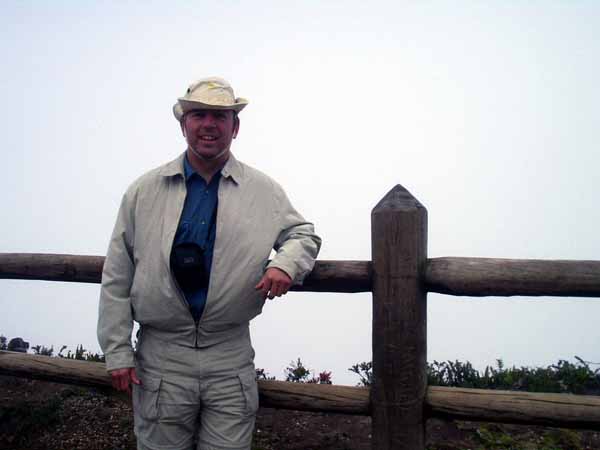
Even though I went to the edge of the crater I saw less of Vulcan Poas than Vulcan Arenal. I wanted to see magma, or at least a deep crater spewing sulfurous gas. Instead I got another uncooperative volcano. Because Poas was something of a disappointment the tour guide took us to the handicrafts village of Sarchi and the town of Grecia, best known for its all metal church. There was a reason for making the church out of metal, tin I think, but I can't remember what it was. The acoustics were terrible:
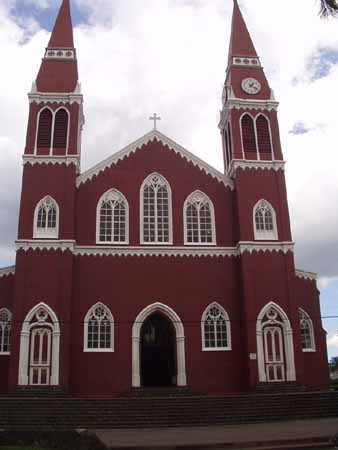
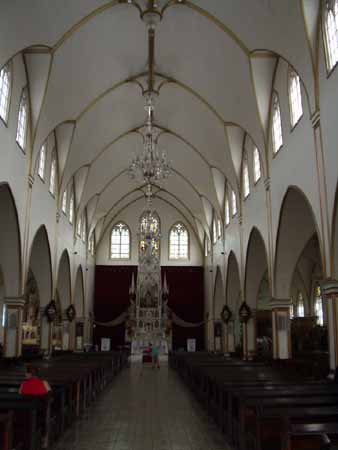
I hung around San Jose for a few more days while I recovered from my cold. On January 11 I took the bus back to Playa Samara for more Intercultura Spanish classes, this time entirely at the beach.
I returned to San Jose on February 24 for a few days of mundane stuff; arranging an extension on income taxes, mailing school materials home, planning my next move, etc. After that I headed to a beach town just down the Nicoya Peninsula from Samara, but difficult to get to without returning to San Jose. San Jose is the transportation hub of Costa Rica, it's hard to get anywhere in the country without going through it. Anyway, my next stop was the hippy beach town of Montezuma:
After seeing the waterfall, the beaches and the monkeys there wasn't much else to do at Montezuma. Also the old hippies were getting a little annoying. So on March 3 I took a boat from the tip of the Nicoya peninsula east to the mainland of Costa Rica and Jaco.
I returned from Jaco March 24 to make travel arrangements to Nicaragua, recover from an ear infection, and enjoy a hotel room with TV and air conditioning. On the first of April I got up at 4:30 (groan) to catch a 6:00 a.m. bus to Managua, which stopped in Granada, my destination. It took over five hours to reach the border, and over an hour and a half to cross. Nicaragua actually makes people claim their bags and open some of them for inspection. That is unusual, but not a bad idea. I got off the bus mid afternoon in the city of Granada.